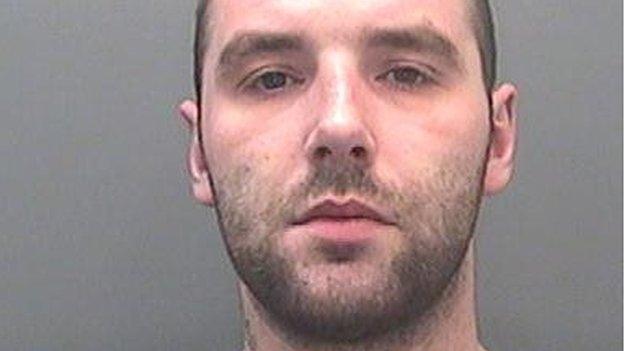Conner Marshall: Mother fears probation changes after son's murder
- Published

Conner's mother Nadine says she is concerned how the changes will be implemented
The mother of a teenager who was killed by a man on probation has joined calls to reunify Wales' probation service.
Nadine Marshall fears that unless the National Probation Service (NPS) has responsibility for programmes and unpaid work, the risk of offenders committing further offences increases.
Her son Conner, 18, was murdered in 2015 by a man in breach of probation.
The way offenders are managed in Wales changes next week, with a private firm handing back most work to the NPS.
The UK Government said there was "widespread support" for the proposals.
But concerns have been raised there are still important areas of offender rehabilitation that will be under the remit of private firms or charities.
The probation officers' union Napo pointed out that in so many serious further offence reviews, or homicide reviews, there is a call for the free flow of information so risk assessments are as accurate as possible.
It worries that by keeping these two elements of offender management and rehabilitation separate, it reduces that flow, which in turn increases the risk to the public.

Conner Marshall was attacked while staying at a caravan site with friends
'You don't know when that worm will turn'
Conner Marshall, 18, died four days after being beaten with a pole by David Braddon at Trecco Bay caravan park in Porthcawl, Bridgend county, in 2015.
Braddon - who had mistaken Conner for someone else - was jailed for life after admitting murder.
In the nine months before the killing, Braddon, from Caerphilly, breached his probation by missing eight separate meetings.
He was being monitored by a private company - Working Links, Wales' Community Rehabilitation Company (CRC) - after he was convicted for drugs offences and assaulting a police officer.
The Ministry of Justice (MoJ) denied the unprovoked attack could have been predicted or prevented and the company has since gone into administration.
Mrs Marshall, from Barry, Vale of Glamorgan, backed the concerns of Napo that the changes will leave essential parts of probation being done by non-specialists.
She is worried there might be more "devastating cases like ours".
"In our case, you don't know when that worm will turn," she added.
"It reaches back to the accountability of it - particularly if third sector organisations are expected to pick up the pieces.
"Risk is transient - it's not static, what's a risk today, isn't necessarily one tomorrow. There could be any manner of things that happen."
She said it was a huge expectation to expect non-professionals to notice changes in behaviour or triggers.

David Braddon was jailed for life for murdering Conner Marshall in 2015
Napo said two separate organisations dealing with an offender also made it harder for professionals to know if the risks had increased.
The changes will bring low and medium-risk offenders back under the NPS, alongside the management of high-risk offenders.
But CRCs or third sector organisations will be responsible for unpaid work that offenders must carry out - as well as the courses they have to attend - for example, programmes for addicts, addressing aggressive behaviour or domestic violence.
Four years ago the service was split, with private firms created to manage all but high-risk offenders, leading to a number of critical reports and a rise in the number of people on probation going on to commit serious crimes.
These changes will happen in Wales first and will roll out to England in 2021.
What are the political parties saying?
In its response to the consultation earlier this year, external, the UK Government noted there was "widespread support" for the proposals in Wales and they were "broadly considered" as a positive step.
Labour's manifesto said it would "reunify probation and guarantee a publicly run, locally accountable probation service".
Plaid Cymru said it wanted to see the entire probation service devolved, alongside policing and justice. "We want to ensure people are properly assessed and supervised so they are not a risk to the public," the party added.
The Liberal Democrats said: "The whole probation system needs to be reunified. The planned reforms - including ending the existing CRC contracts early - are clearly necessary but we do not believe these will go nearly far enough to address the major problems in probation".
Other parties have been approached for comment.
- Published17 April 2019

- Published27 July 2018

- Published24 October 2018

- Published25 October 2017

- Published5 January 2016

- Published3 June 2015
